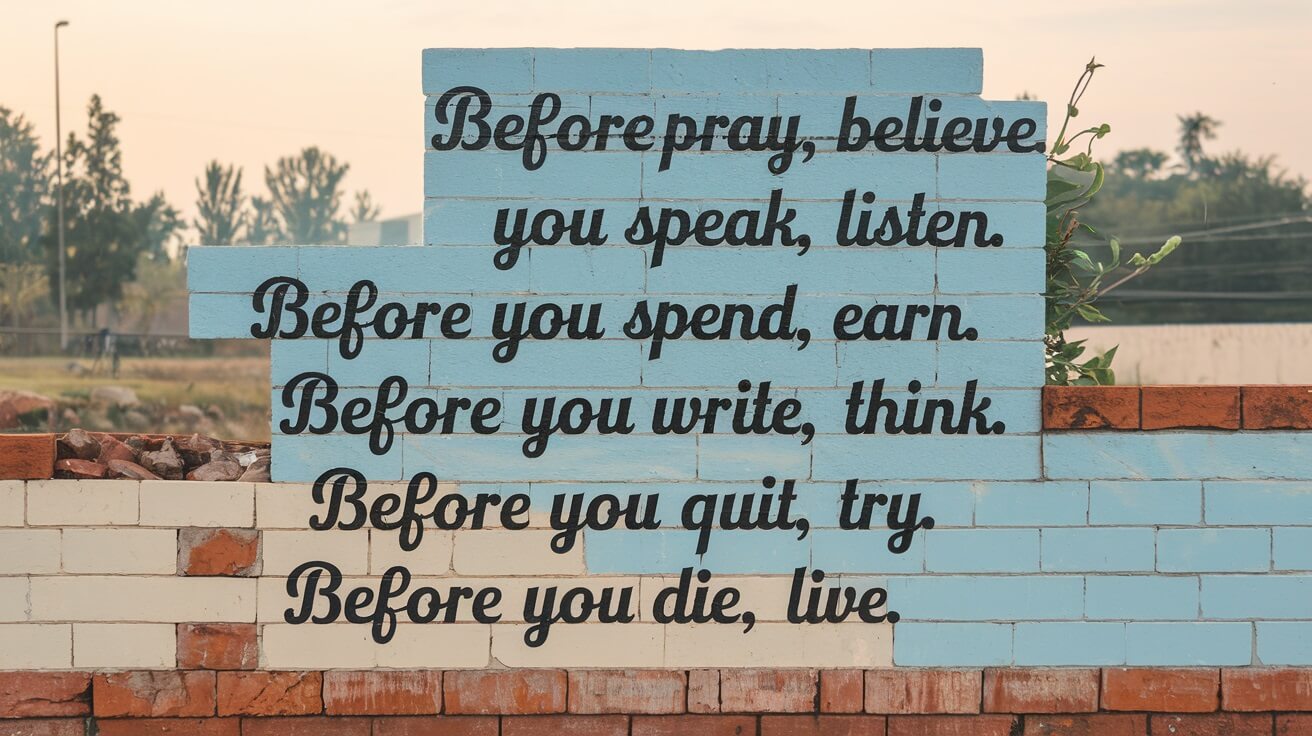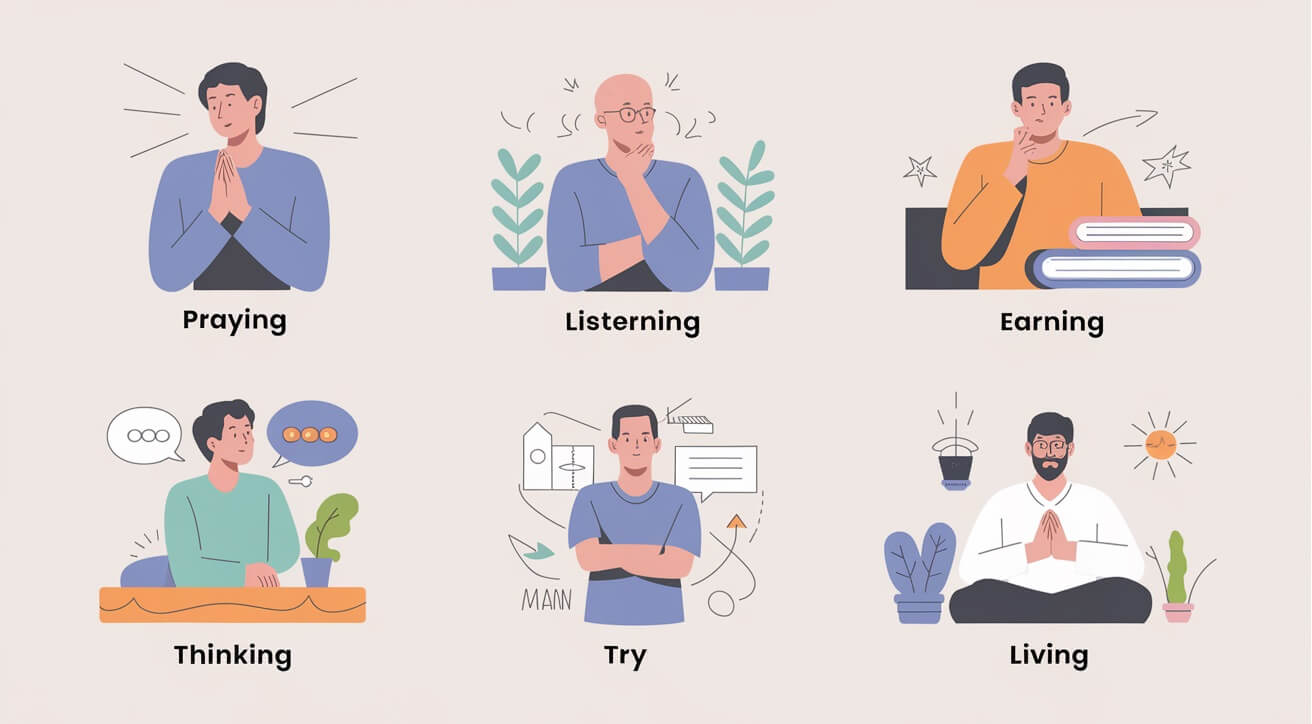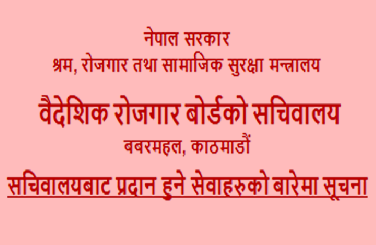
Six Ethics of Life: A Practical Guide to Intentional Living
Ethics guide our actions, shape our decisions, and help us live more fulfilling lives. Amid the hustle of everyday life, it's simple to forget what’s essential. That’s where the Six Ethics of Life come in—a simple yet profound framework for living with purpose and mindfulness.
Whether navigating personal challenges or seeking to strengthen relationships, these ethics offer actionable principles that resonate across cultures and beliefs. Let’s explore each ethic in detail, uncovering how they can transform your thinking and life.

Before You Pray, Believe
Understanding the Power of Belief
Belief is the foundation of meaningful action. Without it, prayer or any act of faith feels empty. But belief isn’t just about religion—it extends to having confidence in yourself, trusting others, and having faith in the process.
-
Research Insight: Studies show that belief systems significantly enhance resilience. According to the Positive Psychology Journal, individuals with strong beliefs tend to bounce back from adversity faster.
-
Personal Experience: I hesitated before applying for a role that seemed out of reach. But believing in my abilities became the first step toward landing a job I thought was impossible.
How to Cultivate Strong Belief
-
Daily Affirmations: Every morning, remind yourself of your strengths. Phrases like “I am capable” or “I can handle challenges” can help.
-
Visualize Success: Picture yourself achieving your goals. Visualization isn’t just motivational—it primes your brain for action.
-
Surround Yourself with Positivity: Spend time with people who encourage and uplift you. Their energy will reinforce your belief system.
Belief lays the groundwork for progress. Before you leap of faith, ground yourself in the power of believing.
Before You Speak, Listen
Why Listening Matters
How often do we rush to respond before fully understanding someone’s perspective? Listening is more than hearing words; it’s about creating space for others to feel valued and understood.
-
Research Insight: A study published in Harvard Business Review found that active listening improves communication by over 85%. Relationships thrive when individuals feel heard.
-
A Real-Life Anecdote: A close friend once shared how they felt disconnected from their family. I decided to truly listen without offering solutions. Weeks later, they told me it was one of the most healing conversations they’d ever had.
Steps to Practice Active Listening
-
Be Present: Eliminate distractions like your phone or other tasks when someone speaks to you.
-
Ask Questions: Clarify what the other person says instead of jumping to conclusions.
-
Reflect: Summarize what you’ve heard to show understanding and care.
Listening improves communication, strengthens bonds, builds trust, and prevents misunderstandings. The next time you’re conversing, pause and listen fully before responding.
Before You Spend, Earn
The Value of Financial Responsibility
We live in a society that often prioritizes instant gratification. This ethic reminds us to focus on earning before spending. Financial discipline doesn’t just create security—it fosters independence and peace of mind.
-
Research Insight: According to NerdWallet, 60% of people experience financial stress due to impulsive spending. Financial mindfulness is crucial for long-term stability.
-
Personal Anecdote: I struggled with credit card debt from unnecessary purchases early in my career. It wasn’t until I started budgeting and prioritizing savings that I gained control over my finances.
Practical Financial Tips
-
Create a Budget: Divide your income into essentials, savings, and discretionary spending.
-
Delay Purchases: Wait 48 hours before making non-essential buys. This cooling-off period often reduces impulsive decisions.
-
Invest Wisely: Even small contributions to a retirement or mutual fund can grow significantly over time.
Earnings before spending teaches patience, accountability, and the importance of living within your means.
Before You Write, Think
The Importance of Thoughtful Communication
Words carry immense power—they can heal, inspire, or hurt. Writing without thinking often leads to miscommunication or regret. This ethic challenges us to pause, reflect, and ensure our words align with our intentions.
-
Research Insight: A LinkedIn survey on workplace interactions highlights that thoughtful communication reduces misunderstandings by 70%.
-
A Personal Example: I once sent an email in frustration, only to regret it moments later. Now, I draft important messages, let them sit, and revisit them with a clear mind.
How to Think Before You Write
-
Pause and Reflect: Ask yourself, “What is the purpose of this message?”
-
Consider the Recipient’s Perspective: How will they interpret your words?
-
Edit for Clarity: Simplify your language to avoid confusion or misinterpretation.
Thinking before writing ensures your words add value rather than create harm.
Before You Quit, Try
The Importance of Perseverance
We all face moments when quitting feels like the easiest option. But some of life’s most significant rewards come after we push through challenges. This ethic encourages persistence in the face of difficulty.
-
Research Insight: Entrepreneur.com says entrepreneurs who persist after initial failures are 80% more likely to succeed.
-
A Real-Life Example: J.K. Rowling’s first Harry Potter manuscript was rejected by 12 publishers. Her perseverance not only changed her life but also inspired millions worldwide.
Tips for Building Resilience
-
Break Goals into Smaller Steps: Focus on one step at a time to make daunting tasks manageable.
-
Celebrate Progress: Acknowledge your efforts, no matter how small.
-
Seek Support: Surround yourself with people who inspire and motivate you.
Trying before quitting teaches resilience and fosters a growth mindset, opening doors to opportunities you might have overlooked.
Before You Die, Live
Embracing Life Fully
Life passes quickly, yet many of us become trapped in routines and overlook the essence of truly living. This ethic invites us to embrace joy, gratitude, and meaningful connections every day.
-
Research Insight: Studies on gratitude reveal it increases overall happiness by 25%, according to Positive Psychology.
-
Personal Reflection: A mentor once advised me to treat each day as a gift. Since then, I’ve consciously tried to savor the little things—a quiet morning, a heartfelt conversation, or a beautiful sunset.
How to Live Fully
-
Practice Gratitude: Write down three things you’re thankful for daily.
-
Focus on building relationships: Dedicate meaningful time to the people you care about.
-
Pursue Your Passions: Whether it’s painting, hiking, or volunteering, do what lights you up.
Living isn’t just about existing—it’s about making each moment count.
Conclusion
The Six Ethics of Life provides a timeless guide to living with purpose and mindfulness. By believing before you pray, listening before you speak, earning before you spend, thinking before you write, trying before you quit, and living before you die, you can create a fulfilling life for yourself and inspire others.
Start small. Choose one ethic to focus on this week. Reflect on how it changes your perspective and share your experiences with someone close to you. Ethical living isn’t about perfection—it’s about progress and intention.
FAQs
What are the Six Ethics of Life?
These are principles for intentional living: believe before you pray, listen before you speak, earn before you spend, think before you write, try before you quit, and live before you die.
How can these ethics improve daily life?
They foster mindfulness, resilience, and stronger relationships, helping you make thoughtful choices.
Are these ethics relevant in professional settings?
Ethics like listening, thinking before communicating, and perseverance are key to workplace success.
Why is "Before you die, live" so important?
It emphasizes making the most of life and cherishing every moment.
How do I start applying these ethics?
Begin with one ethic that resonates with you and practice it consciously in your daily routine.






